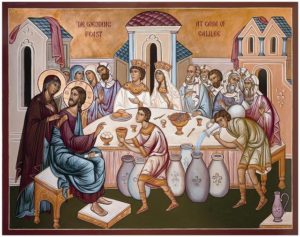 “This is a great mystery‚and I take it to mean Christ and the church”
“This is a great mystery‚and I take it to mean Christ and the church”
(Ephesians 5:3’).
Marriage is a beautiful thing. I have been married for 25 years and I cherish every minute of it. I know however that many do not share the same experience. Some say that marriage is what you make of it‚ but the Church insists that there is an intrinsic goodness in marriage. Marriage is good because not because we humans give it some value‚ but because God Himself presents it to us as good and useful: “man will leave his mother and his father and will cleave to is wife and the two should be one flesh.” This is the main reason why we don’t have an exchange of vows. The exchange of vows gives marriage a relative value‚ according to what the spouses appreciate and commit to‚ but the blessing of the Church shows that marriage is good because it comes from God. Only in Him things are good. If we take the sacred content out of marriage‚ we can fill the remaining empty remaining with anything we want‚ and marriage can be defined and redefined at will.
So what is marriage for? Some want to say it is for tradition. But whose tradition? I have a friend that is a non-practicing catholic. His son married a girl whose parents were Buddhists. So‚ to please the parents‚they had a non-denominational Christian wedding followed by a Buddhist ceremony. Their marriage respected their parent’s “tradition” but the couple had‚ obviously‚ none of their own.
Others say marriage is for children‚ for reproduction. But how many couples nowadays use contraception and‚ when they think they are ready‚ they cannot have children anymore therefore relying on extreme and expensive reproductive technologies like IVF in order to have the children they kept postponing.
Some say for love‚ but what type of love? Friendship? Lust? Platonic? A little of both? Love is probably the most confused concept in our current culture. Then what is marriage for? The Gospel gives a good definition: “This is a great mystery‚ and I take it to mean Christ and the church” (Ephesians 5:3’).
The union in the flesh
In the original goodness of God’s creation‚ Man was created out of the triune love of God and‚ bearing God’s image‚ he could not be fully expressed other than‚ at its turn‚ in a relationship of love with another creature that is equal to him‚ Eve[i].
Both man and the woman possessed‚ before the Fall‚ just like the animals to which they resemble‚ the respective anatomical features that make them different and complimentary to one another‚ including the sexual organs. However‚ after St. Gregory‚ marriage‚ that is to say the sexual intercourse‚ was not needed before the Fall‚ and‚ if man would not have trespassed the commandment‚ the matter of the multiplication would not have been sexual‚ but‚ the same or similar of that of the angels.
St. Gregory asserts that‚ in the final restoration of man‚ man will be restored to this state‚ before the fall‚ when‚ were although living as man and woman‚ they were living like angels‚ without marriage. In the Kingdom‚ the differences between sexes will not disappear‚ only the function of the sexual instinct‚ because it will not be needed anymore‚as it was not needed before the fall. Man and woman will keep their anatomical differences but the functions of their physiology will be adapted to the new situation. Of course‚ only God knows in what form[ii].
St. Gregory is not alone in this teaching; St. John Chrysostom follows him in the same direction‚ as well as St. Maximus the Confessor and St. John Damaskinos‚ amongst others. But very importantly‚ this is not to say that there was no intimacy between Adam and Eve in paradise; there was‚ as they were called to discover‚ love and attachment to each other‚ but it was not of a sexual nature. This is something that in our oversexualized society cannot be even conceived‚ but we have to remember that man was created for a loftier goal than just acting on animal instincts. Man was created as male and female to recreate between them the icon of the loving bond of the Holy Trinity‚ that goes beyond the sexual instinct.
A good illustration of this restoration is the icon of the Descent of Christ into Hades: Christ lifts Adam and Eve and‚ doing so‚ He unites them through Him‚ the two sides of humanity‚ redeemed and brought back together.
This not to say that sexuality as we know it is completely devoid of any redeeming power. The union in the flesh between man and women is something that God has given us‚ not only to procreate‚ which is a primary goal‚ but also to teach us‚ through the desire of the flesh‚ of a higher desire‚ the ultimate union with Christ that transcends all flesh. Thorough all aspects of marriage‚ Christ is ultimately leading us to another wedding‚ a chaste one‚ with the Him‚ the Bridegroom of the Church.
“Sex is not evil; it is a gift from our God. But it can become a hindrance to someone who desires to devote all his strength to a life of prayer…Concerning sex‚ we must strive for self-control. St. Paul tells us to seek peace and sanctification‚ without which it is impossible to see the Lord. Let us pursue holiness‚ then‚ in order to attain the Kingdom of Heaven.”[iii] (St. John Chrysostom)
We can safely say that sexuality‚ as we know it after the fall‚ emerged as a consequence of the fall‚ the loss of the angelic life and the appearing of death. It is something necessary and useful in the current state of man for the perpetuation of mankind and the completion of the union between man and women‚ but is not the ideal state. Sexuality‚ has to eventually be transcended in Christ‚ for the restoration of man to be complete.
Christ And The Tranfiguration Of Sexuality
Christ‚ the new Adam‚ is the embodiment of the fulfillment of the potential of the original Adam. He is born without conception through a virgin birth‚ thus transcending sexuality. The incarnation of Christ in a male body‚ shows Him as a full man‚ having all that a man has‚ doing all that a man does except for acting on His sexuality. Christ diminishes the need for reproduction by proclaiming that “the kingdom of heaven is at hand” and in the Kingdom there will be no reproduction anymore‚but angelic life with no marriage.
Christianity blesses the fleshly union of the Christian marriage‚ yet He ultimately leads us to discover chastity‚ in the expectation of the Kingdom. Acknowledging this goal‚ the Holy Apostle Paul affirms: “Now concerning the things whereof ye wrote unto me: It is good for a man not to touch a woman. Nevertheless‚ to avoid fornication‚ let every man have his own wife‚ and let every woman have her own husband.” (1Cor 7:1-2) The marriage is viewed as lesser than chastity‚ only because of the height of the ideal level of the Kingdom set by Christ. But the marriage is sacred and is chaste‚ and‚ even as a somewhat lower form‚ as we saw‚ brings man and woman in a union that resembles and‚ if lived correctly‚ leads to the final union with Christ‚our chaste Bridegroom.
All matters of sexuality ought to be thus confined to the monogamous‚heterosexual‚ sacramental union between a husband and a wife‚ with the dual purpose of procreation and union of the two into one flesh. “For this reason a man shall leave his father and his mother‚ and be joined to his wife; and they shall become one flesh.” (Genesis 2:24‚Ephesian 5:31) Anything that falls out of this well-defined context misses the mark and therefore is sin. A sexuality that is devoid of the context of sacramental marriage and its salvific end goal‚ as defined by the Church‚ is sinful‚ not because it breaks some arbitrary rules‚ but because it goes against the fulfillment of the potential of man and the restoration of the kingdom.
This is why the Church does not differentiate between the various sexual sins‚ but sees them all against one’s salvation. The Church is not an umpire of the rules‚ nor a judge‚ but‚ as St. John Chrysostom affirms‚is a hospital for the sick. Therefore it is in Her duty to teach and affirm what is profitable for the soul and advise against what is harmful.
The fall is the consequence of the man’s actions according to instinct‚like a non-rational being. So why would we now repeat the same mistake and continue to act instinctually rather than resisting to instinct and sinful impulses and rise above the condition of the “garments of skin”? In instincts‚ stirred by Satan as of old‚ there is death and‚ in the virtues‚ according to Christ there is life and the fulfillment of Man’s potentiality.
Wedding As Restoration Of Humanity
The fact that the woman was taken from man shows that woman and man are part of the same creation‚ that they share the same nature; yet‚ they are ontologically different in ways that make them complementary to each other. The union between a man and a woman‚restores therefore‚ in a way‚ the fullness of humanity.[iv]
Marriage‚ in the Christian understanding as monogamous‚heterosexual and blessed by God‚ is part of the good existence that St. Maximus speaks about. St. Maximus does not deny the value of marriage‚ because he sees it as the way instituted by God for human procreation that we cannot reject.[v] However‚ marriage has to be regarded in the context of the working of the virtues. Marriage has to retain its salvific purpose and not be degraded to a union of pleasure‚convenience‚ social status or anything else that might pervert its spiritual purpose.
The union in the flesh between husband and a wife united in Holy Matrimony transcends sexuality in its animal‚ non-rational form. It is a form of chastity‚ as the marital bed is undefiled. Christ performed His first miracle at a wedding‚ transforming what is common‚ water‚ into something special‚ the good wine‚ showing how the union between a man and a woman can lead to something better than living alone. We see thus how‚ even through the use of those things that are lower‚ like sexuality‚ once they are positively transformed through the fulfillment of their God intended purpose‚ they support us in our communion with God. Their perversion however‚ into increasingly degraded forms‚ has the opposite effect of alienation from God and missing the mark of the likeness of God.
Man and woman‚ icon and vocation‚ synergy and complementarity
In the epistles of the Holy Apostle Paul[vi] and Peter[vii]‚ we have several passages that address the relationship between man and woman that would lead to a spiritual union and restoration of the fullness of man through marriage. These passages are read during the sacraments of crowning and are meant as guidelines to the new couple that enters a life of communion. It is unfortunate though that a superficial reading of these scriptural accounts could lead someone to the wrong conclusion that there is some plot against women‚ a sort of patriarchal ploy meant to undermine women and lead them into unquestioning submission. But‚ if we believe the Scriptures to be true and we are not ashamed of their teaching and find ourselves ready to follow them‚ we have to read them carefully and meditate upon their meaning with the help of the Fathers.
St. John Chrysostom says it all in a simple phrase: “Let us take as our fundamental position then‚ that the husband occupies the place of the ‘head’‚ and the wife the place of the ‘body’ “[viii]. This pretty much sums up the opinion of all the Fathers who uphold that man and woman share the same nature‚ both physical and spiritual‚ and that there is an ordered relationship in which man takes precedence. We can affirm then that‚ vocationally‚ based on the order and purpose of Creation‚ the husband is called to be the head and lead his wife that is called to be the body‚ and that the two should be united in Christ.
The vocation of man to be a head in relation with the woman‚ the body‚is not intended as tyrannical autocracy‚ but to be an icon of the relationship between Christ‚ the Head and the Church‚ His Body. Christ’s relationship with the Church is a sacrificial one‚ not one of exploitation. He gives first‚ sacrificially‚ not expecting anything in return. On the other hand the woman should respond to the impulse of love coming from man with a similar love‚ keeping the concord between the various parts of the body and advancing the unity in Christ.
Husbands and wives share the burden of their marital union by fulfilling their vocational roles. It does not mean that one is better than the other‚ but only that they have different roles that have to be respected for the completion of the union. These roles complete one another and‚ through the synergy of their efforts‚ the two advance much faster towards God. However‚ if the vocation is refused and the roles confused‚ the marriage moves in circles and ceases to fulfill it’s salvific purpose.
I have heard recently a beautiful comparison between the role of a woman in the family and the various wonderworking icons of the Theotokos. We have first the Theotokos as Guidance (Hodgitria) as the woman is the guide of her children‚ showing them the path to God. Then she is Quick To Hear (Gorgopikoos) as a mother is always quick to listen to all the problems in a household. She is also The Unexpected Joy‚ as women are capable to create the most sublime and unexpected joy in one’s marriage. She is also the Sweet Kiss(Glycophyloussa) expressing the tenderness that only a woman can show. We also have her as the Most Caring (Paramythia) because a mother’s heart can understand and soothe the pain like no one else. Having the Teotokos as a guide and model‚ women can fulfill their vocation as wives and lead a life of sanctity and alignment with their husbands and ultimately with Christ. [ix]
Husbands as well are called to be an icon of Christ‚ to lead their wives and their households toward God‚ and to do this is a gentle and understanding way‚ taking into consideration all the needs of the body‚so the body will willingly obey without coercion. Man cannot act selfishly‚ but only sacrificially‚ as they provide for and protect the household with the price of their own lives‚ renouncing their petty interests and serving the overarching purpose of the marital union.
A marriage however is not complete in itself‚ but the home is the small church‚ linked intrinsically with the Greater Church of Christ. Marriage is overall communion‚ communion that has to be continually strengthened by working together as a unit the pillars of faith: prayer‚fasting‚ and almsgiving. Man and woman begin to transcend the differences between male and female‚ by the fulfillment of their respective vocations‚ through the sacrificial exchange demanded by their respective roles‚ completing more and more in themselves the icon of Christ.
[i] Marius Telea‚ op. cit.‚ p 170
[ii] Marius Telea‚ op. cit.‚ p 171
[iii] St. John Chrysostom‚ On marriage and Family Life‚ Homily 19
[iv] Fr. Mar-Antoanie Costa de Beauregard‚ Teologia sexualitatii‚heterosexualitatea si homosexualitatea‚ Ed. Christiana Bucuresti‚2004‚ pp 2’-24
[v] Lars Thunberg‚ op. cit‚ p 417
[vi] “Wives‚ submit yourselves unto your own husbands‚ as unto the Lord. For the husband is the head of the wife‚ even as Christ is the head of the church: and he is the saviour of the body. Therefore as the church is subject unto Christ‚ so let the wives be to their own husbands in every thing. Husbands‚ love your wives‚ even as Christ also loved the church‚ and gave himself for it; That he might sanctify and cleanse it with the washing of water by the word‚ That he might present it to himself a glorious church‚ not having spot‚ or wrinkle‚ or any such thing; but that it should be holy and without blemish. So ought men to love their wives as their own bodies. He that loveth his wife loveth himself. For no man ever yet hated his own flesh; but nourisheth and cherisheth it‚ even as the Lord the church: For we are members of his body‚ of his flesh‚ and of his bones. For this cause shall a man leave his father and mother‚ and shall be joined unto his wife‚ and they two shall be one flesh. This is a great mystery: but I speak concerning Christ and the church. Nevertheless let every one of you in particular so love his wife even as himself; and the wife see that she reverence her husband.” (Ephesians 5:2’-3’)
[vii] “Likewise‚ ye wives‚ be in subjection to your own husbands; that‚ if any obey not the word‚ they also May without the word be won by the conversation of the wives; while they behold your chaste conversation coupled with fear. Whose adorning let it not be that outward adorning of plaiting the hair‚ and of wearing of gold‚ or of putting on of apparel; But let it be the hidden man of the heart‚ in that which is not corruptible‚ even the ornament of a meek and quiet spirit‚ which is in the sight of God of great price. For after this manner in the old time the holy women also‚ who trusted in God‚ adorned themselves‚ being in subjection unto their own husbands: Even as Sara obeyed Abraham‚calling him lord: whose daughters ye are‚ as long as ye do well‚ and are not afraid with any amazement. Likewise‚ ye husbands‚ dwell with them according to knowledge‚ giving honor unto the wife‚ as unto the weaker vessel‚ and as being heirs together of the grace of life; that your prayers be not hindered.” (1 Peter 3:1-7)
[viii] St. John Chrysostom‚ Homily 20 on Ephesians‚ found in Patrick Mitchell‚ The Scandal of Gender‚ Regina Orthodox Press 1998‚ p19
[ix] From an interview with Fr. Gheorge Holbea‚https://viatalatara.wordpress.com/2008/10/09/maica-domnului-si-femeia-moderna/

















